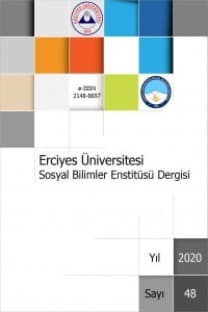Girişimcilik, Bilgi Toplumu Ve Üniversitelerin Değişen Anlamı
Girişimcilik, Girişimci Üniversiteler, İnterdisipliner, Transdisipliner Çalışma
Entrepreneurship, Knowledge-Based Society And The Changing Meaning Of Universities
___
Austin, A.E., Higher Education in Developing World: Changing Contexts andInstitutional Responses, Greenwood Publishing, USA, 2002
Baumann M., The Future of Universities and the Fate of Free Inquiry and Academic Freedom, Social Research, Sayı: 76, 2009
Brint S., Creating the Future: New Directions in American Research Universities, Minerva, Sayı:43, 2005
Clark, R., Creating Entrepreneurial University: Organizational Pathways of Transformation, Oxford, IAU Press, Pergamon, 1998
Elwell F., Weber M., Macrosociology: The Study of Sociocultural Systems, Presentation, 2011
Erickson H.L., Stirring the Head, Heart, and Soul-Redefining Curriculum and Instruction, California Corwin Press, 1995
Farell L., Girişimcilik Üzerine Dersler Röportajı, Power Dergisi, Kasım, 1997
Feces A., The Bologna Process-Governing Higher Education in Europe Through Standardisation, Revista Espanda Education Comparada, Vol:12, 2006
Fishman D., Crossing Borders: Toward a Trans-disciplinary Scientific Identitiy, Studies in Higher Education, Sayı:27, 2002
Göksan T.S., Soner Uzundurukan S., Keskin N., Yaşam Boyu Öğrenme ve Avrupa Birliği'nin Yaşam Boyu Öğrenme Programları, 1.İnşaat Mühendisliği Eğitimi Sempozyumu, Antalya, 2009
Gümüş A., Kurul N., Üniversitelerde Bologna Süreci Neye Hizmet Ediyor?, Eğitim Sen Yükseköğretim Bürosu, 2011
Hakala J., The Future of Academic Calling? Junior Researchers in the Entrepreneurial University, High Education, Sayı:57, 2009
Jacobs H.H., Planning For Curriculum Integration, Integrating the Curriculum, Association for Supervision and Curriculum Development, 1991
Nealon J.T., The Economics of Academic Freedom or Plato’s P&T Commitee, South Atlantic Quaterly, 108-4, Duke University Press, 2009
Odabaşı Y., 21.Yüzyıl’ın Üniversite Modeli Olarak Girişimci Üniversiteler, Değişim Çağında Yükseköğretim, Global Trendler-Paradigmal Yönelimler, İzmir:Yaşar Üniversitesi Yayını, 2007
Odabaşı Y., Değişimin ve Dönüşümün Aracı Olarak Girişimci Üniversite, Üniversitelerde Stratejik Planlama Paneli, Akdeniz Üniversitesi, 2005
Parellada F.S., Bertran J.C., The Responses of Higher Education Institutions to Global Challenge: Innovative Universities and Human Resources Development, Higher Education in Europe, Sayı:24, 1-74., 1999
Pınarcıoğlu M., CP558 New Modes of Intervention in Planning Ders Notları, Ortadoğu Teknik Üniversitesi Mimarlık Fakültesi, Şehir ve Bölge Planlama Bölümü, 2011
Polster C., The Future of the Liberal University in the Era of the Global Knowledge Grab, Kluwer Academic Publishers, Netherlands, 2000
Steiner G., Posch A., Higher Education for Sustainability by Means of Transdisciplinary Case Studies: An innovative Approach for Solving Complex Real World Problems, Journal of Cleaner Production, Sayı:14, 2006
Ülgener, F.S., İktisadi Çözülmenin Ahlak ve Zihniyet Dünyası, Toplu Eserler II, Derin Yayınları, 2006
Yokomaya, K., Entrepreneurialism in Japanese UK Universities: Governance, Management, Leadership and Funding, Higher Education, Sayı:52, 2006
- Yayın Aralığı: Yılda 2 Sayı
- Yayıncı: Erciyes Üniversitesi
İbn Arabi’de Ontolojik Açıdan İnsan
Kayseri Ekonomisinin Üretim Yapısı: Değişme, Gelişme ve İleriye Yönelik Tahminler
Türkçe “–de” Ve Japonca “-ni, -de” Durum Ekleri Ve Japonca Öğretimi Üzerine
Naci Atalay DAVUTOĞLU, Birol AKGÜL, Erşan YILDIZ
Girişimcilik, Bilgi Toplumu Ve Üniversitelerin Değişen Anlamı
Fârâbi Düşüncesinde Adalet: Dağıtıcı Ve Düzeltici Adalet Kavramlarının Yansımaları
Japon Doğum Ve Çocukluk Dönemi Geçiş Törenlerinde Şintō Olgusu
Türkiye’de Stratejik Planlama Uygulamaları Ve Avrupa Birliği Ülkeleri Karşılaştırması
